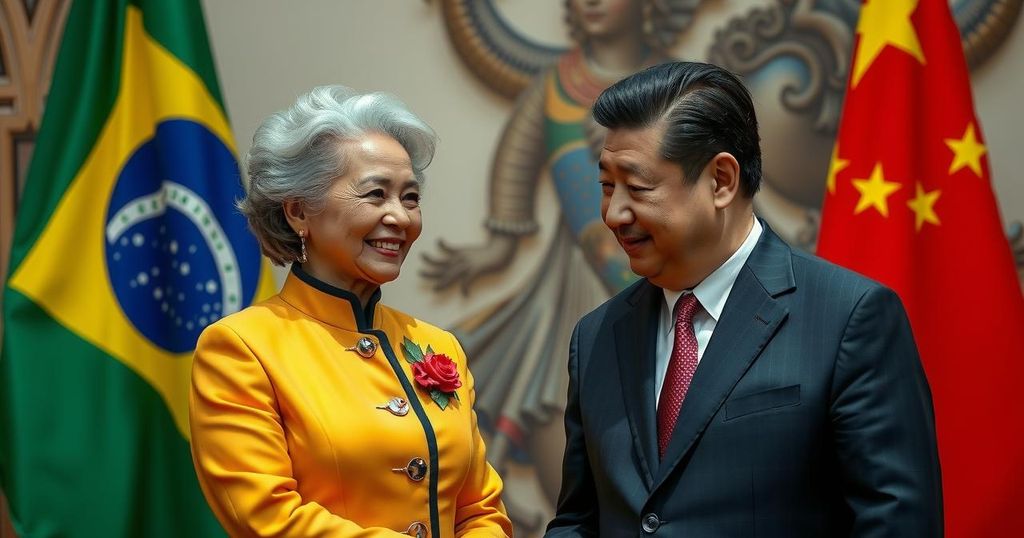Global news
ALVORADA PALACE, ASIA, BILATERAL TRADE, BRASILIA, BRAZIL, BRICS, CHINA, CHINESE COMMUNIST PARTY, COMMUNIST PARTY, ECONOMIC COOPERATION, EDUARDO, FOUNDATION SCHOOL OF SOCIOLOGY, GEOPOLITICS, INTERNATIONAL RELATIONS, JAIR BOLSONARO, LATIN AMERICA, LULA, MEXICO, NORTH AMERICA, PERU, RIO DE JANEIRO, SAO PAULO, SOUTH AMERICA, TRADE RELATIONS, U. S, UNITED NATIONS, UNITED STATES, WHITE HOUSE, XI JINPING
Isaac Bennett
0 Comments
Brazil’s Lula Hosts China’s Xi for State Visit Amid Strengthening Ties
Brazil’s President Lula welcomed China’s President Xi for a state visit, highlighting strengthened ties as they signed 37 agreements across various sectors. This deepening relationship, influenced by geopolitical shifts with the anticipated return of Donald Trump, illustrates Brazil’s strategic pivot towards China after a period of tension under Jair Bolsonaro. Experts suggest this partnership could yield significant economic benefits while requiring careful diplomatic navigation to balance traditional alliances.
On Wednesday, Brazilian President Luiz Inácio Lula da Silva hosted a significant state visit from China’s President Xi Jinping at the Alvorada Palace in Brasilia. This visit marks a pivotal moment in the evolving relationship between Brazil and China, which has been on an upward trajectory since China surpassed the United States as Brazil’s primary export market back in 2009. The two leaders formalized their burgeoning ties by signing 37 comprehensive agreements covering various sectors, including trade, tourism, agriculture, industry, science and technology, health, energy, culture, and education.
Analysts have noted that the deepening relationship between these two countries may be further influenced by the anticipated return of Donald Trump to the presidency in 2025. Expert Flavia Loss from the Foundation School of Sociology and Politics in Sao Paulo remarked, “Latin America has always been forgotten by the United States and the European Union. Who fills that void? China.” President Lula’s recent outreach to China comes after a period of tension under former President Jair Bolsonaro, who had a contentious relationship with China, even blaming the pandemic on the Chinese Communist Party.
In contrast, President Lula has actively worked to repair and enhance diplomatic and economic relations with Beijing as part of a broader strategy to reintegrate Brazil into the global arena. The Brazilian leader underscored the importance of the collaborative efforts between the two nations, suggesting that their cooperation “reverberates around the world,” particularly within the frameworks of the United Nations and the BRICS economies. The trade figures between Brazil and China have been noteworthy; from January to October 2024, trade reached $136.3 billion, with trade having grown substantially since Lula’s first visit to China in 2004.
Additionally, China has extended an invitation for Brazil to participate in its Belt and Road Initiative, aimed at improving global infrastructure. Although Brazil has remained somewhat circumspect, it is exploring potential partnerships in areas such as funding for climate change mitigation. However, experts caution that while deepening ties with China may bring immediate economic benefits, it also has the potential to create frictions with traditional allies, such as the United States and European countries. As noted by Pedro Brites of the Getulio Vargas Foundation, Brazil must balance its relationships carefully as it navigates this evolving geopolitical landscape.
The state visit by President Xi Jinping to Brazil is a critical moment that exemplifies the strengthening of ties between the two countries. Brazil’s increasing reliance on China as its primary trade partner is a notable shift from previous decades when the United States held that position. With a significant number of agreements signed during this visit, economic collaboration is set to expand further across various vital sectors. Additionally, the context of U.S. political shifts underlines the importance of international partnerships for Brazil, positioning China as a strategic ally amid changing global dynamics.
In conclusion, the state visit of President Xi ànl along with the extensive agreements signed signifies Brazil’s strategic pivot towards China, fostering stronger bilateral relations amidst global political changes. This partnership not only strengthens economic ties but also enhances Brazil’s position on the international stage, particularly in the context of anticipated shifts in U.S. foreign policy under a possible Trump administration. As Brazil continues to navigate its relationships with both China and its traditional allies, the challenge will lie in maintaining a balanced diplomatic approach.
Original Source: www.livemint.com




Post Comment